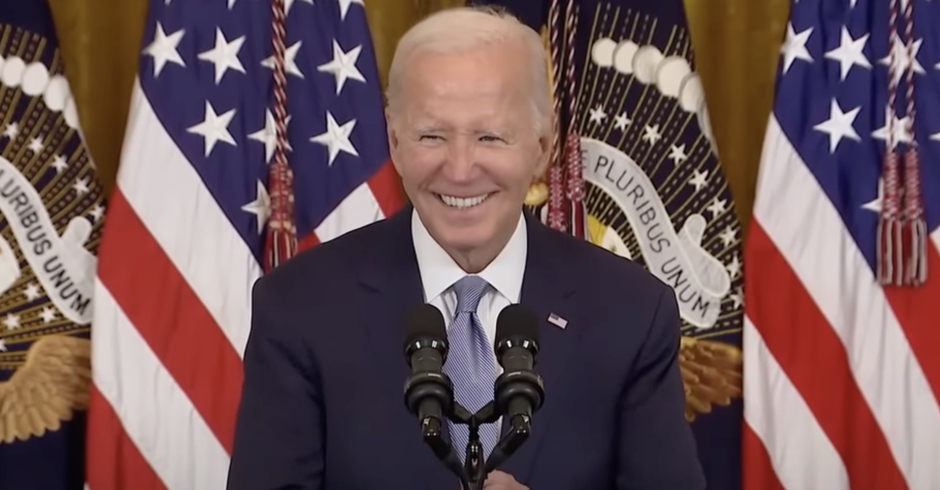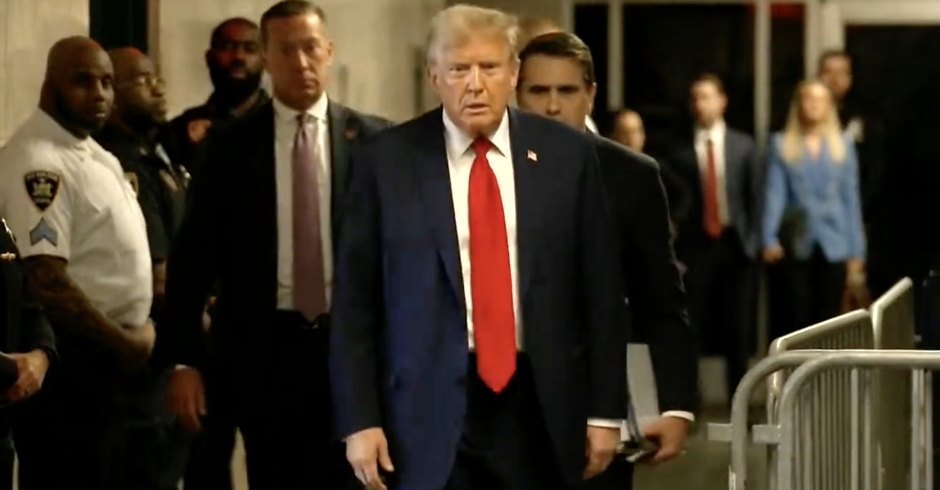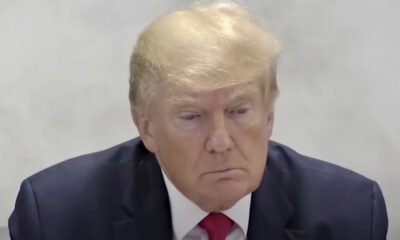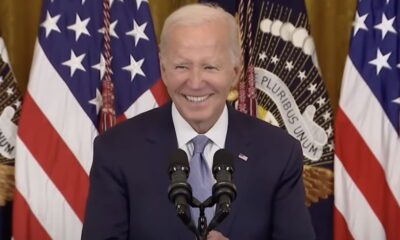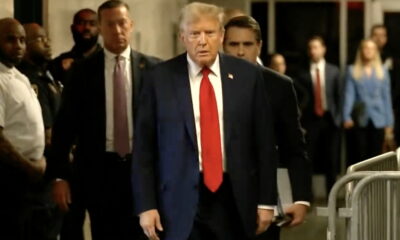Obama’s Libya Speech – Complete Text
The President’s Address to the Nation on Libya – As Prepared for Delivery
National Defense University
Washington, DC
March 28, 2011
Â
As Prepared for Delivery—
Â
Good evening. Tonight, I’d like to update the American people on the international effort that we have led in Libya – what we have done, what we plan to do, and why this matters to us.
Â
I want to begin by paying tribute to our men and women in uniform who, once again, have acted with courage, professionalism and patriotism. They have moved with incredible speed and strength. Because of them and our dedicated diplomats, a coalition has been forged and countless lives have been saved. Meanwhile, as we speak, our troops are supporting our ally Japan, leaving Iraq to its people, stopping the Taliban’s momentum in Afghanistan, and going after al Qaeda around the globe. As Commander-in-Chief, I am grateful to our Soldiers, Sailors, Airmen, Marines, Coast Guardsmen, and their families, as are all Americans.
Â
For generations, the United States of America has played a unique role as an anchor of global security and advocate for human freedom. Mindful of the risks and costs of military action, we are naturally reluctant to use force to solve the world’s many challenges. But when our interests and values are at stake, we have a responsibility to act. That is what happened in Libya over the course of these last six weeks.
Â
Libya sits directly between Tunisia and Egypt – two nations that inspired the world when their people rose up to take control of their own destiny. For more than four decades, the Libyan people have been ruled by a tyrant – Moammar Gaddafi. He has denied his people freedom, exploited their wealth, murdered opponents at home and abroad, and terrorized innocent people around the world – including Americans who were killed by Libyan agents.
Â
Last month, Gaddafi’s grip of fear appeared to give way to the promise of freedom. In cities and towns across the country, Libyans took to the streets to claim their basic human rights. As one Libyan said, “For the first time we finally have hope that our nightmare of 40 years will soon be over.â€
Â
Faced with this opposition, Gaddafi began attacking his people. As President, my immediate concern was the safety of our citizens, so we evacuated our Embassy and all Americans who sought our assistance. We then took a series of swift steps in a matter of days to answer Gaddafi’s aggression. We froze more than $33 billion of the Gaddafi regime’s assets. Joining with other nations at the United Nations Security Council, we broadened our sanctions, imposed an arms embargo, and enabled Gaddafi and those around him to be held accountable for their crimes. I made it clear that Gaddafi had lost the confidence of his people and the legitimacy to lead, and I said that he needed to step down from power.
Â
In the face of the world’s condemnation, Gaddafi chose to escalate his attacks, launching a military campaign against the Libyan people. Innocent people were targeted for killing. Hospitals and ambulances were attacked. Journalists were arrested, sexually assaulted, and killed. Supplies of food and fuel were choked off. The water for hundreds of thousands of people in Misratah was shut off. Cities and towns were shelled, mosques destroyed, and apartment buildings reduced to rubble. Military jets and helicopter gunships were unleashed upon people who had no means to defend themselves against assault from the air.
Â
Confronted by this brutal repression and a looming humanitarian crisis, I ordered warships into the Mediterranean. European allies declared their willingness to commit resources to stop the killing. The Libyan opposition, and the Arab League, appealed to the world to save lives in Libya. At my direction, America led an effort with our allies at the United Nations Security Council to pass an historic Resolution that authorized a No Fly Zone to stop the regime’s attacks from the air, and further authorized all necessary measures to protect the Libyan people.
Â
Ten days ago, having tried to end the violence without using force, the international community offered Gaddafi a final chance to stop his campaign of killing, or face the consequences. Rather than stand down, his forces continued their advance, bearing down on the city of Benghazi, home to nearly 700,000 men, women and children who sought their freedom from fear.
Â
At this point, the United States and the world faced a choice. Gaddafi declared that he would show “no mercy†to his own people. He compared them to rats, and threatened to go door to door to inflict punishment. In the past, we had seen him hang civilians in the streets, and kill over a thousand people in a single day. Now, we saw regime forces on the outskirts of the city. We knew that if we waited one more day, Benghazi – a city nearly the size of Charlotte – could suffer a massacre that would have reverberated across the region and stained the conscience of the world.
Â
It was not in our national interest to let that happen. I refused to let that happen. And so nine days ago, after consulting the bipartisan leadership of Congress, I authorized military action to stop the killing and enforce UN Security Council Resolution 1973. We struck regime forces approaching Benghazi to save that city and the people within it. We hit Gaddafi’s troops in neighboring Ajdabiya, allowing the opposition to drive them out. We hit his air defenses, which paved the way for a No Fly Zone. We targeted tanks and military assets that had been choking off towns and cities and we cut off much of their source of supply. And tonight, I can report that we have stopped Gaddafi’s deadly advance.
Â
In this effort, the United States has not acted alone. Instead, we have been joined by a strong and growing coalition. This includes our closest allies – nations like the United Kingdom, France, Canada, Denmark, Norway, Italy, Spain, Greece, and Turkey – all of whom have fought by our side for decades. And it includes Arab partners like Qatar and the United Arab Emirates, who have chosen to meet their responsibility to defend the Libyan people.
Â
To summarize, then: in just one month, the United States has worked with our international partners to mobilize a broad coalition, secure an international mandate to protect civilians, stop an advancing army, prevent a massacre, and establish a No Fly Zone with our allies and partners. To lend some perspective on how rapidly this military and diplomatic response came together, when people were being brutalized in Bosnia in the 1990s, it took the international community more than a year to intervene with air power to protect civilians.
Â
Moreover, we have accomplished these objectives consistent with the pledge that I made to the American people at the outset of our military operations. I said that America’s role would be limited; that we would not put ground troops into Libya; that we would focus our unique capabilities on the front end of the operation, and that we would transfer responsibility to our allies and partners. Tonight, we are fulfilling that pledge.
Â
Our most effective alliance, NATO, has taken command of the enforcement of the arms embargo and No Fly Zone. Last night, NATO decided to take on the additional responsibility of protecting Libyan civilians. This transfer from the United States to NATO will take place on Wednesday. Going forward, the lead in enforcing the No Fly Zone and protecting civilians on the ground will transition to our allies and partners, and I am fully confident that our coalition will keep the pressure on Gaddafi’s remaining forces. In that effort, the United States will play a supporting role – including intelligence, logistical support, search and rescue assistance, and capabilities to jam regime communications. Because of this transition to a broader, NATO-based coalition, the risk and cost of this operation – to our military, and to American taxpayers – will be reduced significantly.
Â
So for those who doubted our capacity to carry out this operation, I want to be clear: the United States of America has done what we said we would do.
Â
That is not to say that our work is complete. In addition to our NATO responsibilities, we will work with the international community to provide assistance to the people of Libya, who need food for the hungry and medical care for the wounded. We will safeguard the more than $33 billion that was frozen from the Gaddafi regime so that it is available to rebuild Libya. After all, this money does not belong to Gaddafi or to us – it belongs to the Libyan people, and we will make sure they receive it.
Â
Tomorrow, Secretary Clinton will go to London, where she will meet with the Libyan opposition and consult with more than thirty nations. These discussions will focus on what kind of political effort is necessary to pressure Gaddafi, while also supporting a transition to the future that the Libyan people deserve. Because while our military mission is narrowly focused on saving lives, we continue to pursue the broader goal of a Libya that belongs not to a dictator, but to its people.
Â
Despite the success of our efforts over the past week, I know that some Americans continue to have questions about our efforts in Libya. Gaddafi has not yet stepped down from power, and until he does, Libya will remain dangerous. Moreover, even after Gaddafi does leave power, forty years of tyranny has left Libya fractured and without strong civil institutions. The transition to a legitimate government that is responsive to the Libyan people will be a difficult task. And while the United States will do our part to help, it will be a task for the international community, and – more importantly – a task for the Libyan people themselves.
Â
In fact, much of the debate in Washington has put forward a false choice when it comes to Libya. On the one hand, some question why America should intervene at all – even in limited ways – in this distant land. They argue that there are many places in the world where innocent civilians face brutal violence at the hands of their government, and America should not be expected to police the world, particularly when we have so many pressing concerns here at home.
Â
It is true that America cannot use our military wherever repression occurs. And given the costs and risks of intervention, we must always measure our interests against the need for action. But that cannot be an argument for never acting on behalf of what’s right. In this particular country – Libya; at this particular moment, we were faced with the prospect of violence on a horrific scale. We had a unique ability to stop that violence: an international mandate for action, a broad coalition prepared to join us, the support of Arab countries, and a plea for help from the Libyan people themselves. We also had the ability to stop Gaddafi’s forces in their tracks without putting American troops on the ground.
Â
To brush aside America’s responsibility as a leader and – more profoundly – our responsibilities to our fellow human beings under such circumstances would have been a betrayal of who we are. Some nations may be able to turn a blind eye to atrocities in other countries. The United States of America is different. And as President, I refused to wait for the images of slaughter and mass graves before taking action.
Â
Moreover, America has an important strategic interest in preventing Gaddafi from overrunning those who oppose him. A massacre would have driven thousands of additional refugees across Libya’s borders, putting enormous strains on the peaceful – yet fragile – transitions in Egypt and Tunisia. The democratic impulses that are dawning across the region would be eclipsed by the darkest form of dictatorship, as repressive leaders concluded that violence is the best strategy to cling to power. The writ of the UN Security Council would have been shown to be little more than empty words, crippling its future credibility to uphold global peace and security. So while I will never minimize the costs involved in military action, I am convinced that a failure to act in Libya would have carried a far greater price for America.
Â
Now, just as there are those who have argued against intervention in Libya, there are others who have suggested that we broaden our military mission beyond the task of protecting the Libyan people, and do whatever it takes to bring down Gaddafi and usher in a new government.
Â
Of course, there is no question that Libya – and the world – will be better off with Gaddafi out of power. I, along with many other world leaders, have embraced that goal, and will actively pursue it through non-military means. But broadening our military mission to include regime change would be a mistake.
Â
The task that I assigned our forces – to protect the Libyan people from immediate danger, and to establish a No Fly Zone – carries with it a UN mandate and international support. It is also what the Libyan opposition asked us to do. If we tried to overthrow Gaddafi by force, our coalition would splinter. We would likely have to put U.S. troops on the ground, or risk killing many civilians from the air. The dangers faced by our men and women in uniform would be far greater. So would the costs, and our share of the responsibility for what comes next.
Â
To be blunt, we went down that road in Iraq. Thanks to the extraordinary sacrifices of our troops and the determination of our diplomats, we are hopeful about Iraq’s future. But regime change there took eight years, thousands of American and Iraqi lives, and nearly a trillion dollars. That is not something we can afford to repeat in Libya.
Â
As the bulk of our military effort ratchets down, what we can do – and will do – is support the aspirations of the Libyan people. We have intervened to stop a massacre, and we will work with our allies and partners as they’re in the lead to maintain the safety of civilians. We will deny the regime arms, cut off its supply of cash, assist the opposition, and work with other nations to hasten the day when Gaddafi leaves power. It may not happen overnight, as a badly weakened Gaddafi tries desperately to hang on to power. But it should be clear to those around Gadaffi, and to every Libyan, that history is not on his side. With the time and space that we have provided for the Libyan people, they will be able to determine their own destiny, and that is how it should be.
Â
Let me close by addressing what this action says about the use of America’s military power, and America’s broader leadership in the world, under my presidency.
Â
As Commander-in-Chief, I have no greater responsibility than keeping this country safe. And no decision weighs on me more than when to deploy our men and women in uniform. I have made it clear that I will never hesitate to use our military swiftly, decisively, and unilaterally when necessary to defend our people, our homeland, our allies, and our core interests. That is why we are going after al Qaeda wherever they seek a foothold. That is why we continue to fight in Afghanistan, even as we have ended our combat mission in Iraq and removed more than 100,000 troops from that country.
Â
There will be times, though, when our safety is not directly threatened, but our interests and values are. Sometimes, the course of history poses challenges that threaten our common humanity and common security – responding to natural disasters, for example; or preventing genocide and keeping the peace; ensuring regional security, and maintaining the flow of commerce. These may not be America’s problems alone, but they are important to us, and they are problems worth solving. And in these circumstances, we know that the United States, as the world’s most powerful nation, will often be called upon to help.
Â
In such cases, we should not be afraid to act – but the burden of action should not be America’s alone. As we have in Libya, our task is instead to mobilize the international community for collective action. Because contrary to the claims of some, American leadership is not simply a matter of going it alone and bearing all of the burden ourselves. Real leadership creates the conditions and coalitions for others to step up as well; to work with allies and partners so that they bear their share of the burden and pay their share of the costs; and to see that the principles of justice and human dignity are upheld by all.
Â
That’s the kind of leadership we have shown in Libya. Of course, even when we act as part of a coalition, the risks of any military action will be high. Those risks were realized when one of our planes malfunctioned over Libya. Yet when one of our airmen parachuted to the ground, in a country whose leader has so often demonized the United States – in a region that has such a difficult history with our country – this American did not find enemies. Instead, he was met by people who embraced him. One young Libyan who came to his aid said, “We are your friends. We are so grateful to these men who are protecting the skies.â€
Â
This voice is just one of many in a region where a new generation is refusing to be denied their rights and opportunities any longer. Yes, this change will make the world more complicated for a time. Progress will be uneven, and change will come differently in different countries. There are places, like Egypt, where this change will inspire us and raise our hopes. And there will be places, like Iran, where change is fiercely suppressed. The dark forces of civil conflict and sectarian war will have to be averted, and difficult political and economic concerns addressed.
Â
The United States will not be able to dictate the pace and scope of this change. Only the people of the region can do that. But we can make a difference. I believe that this movement of change cannot be turned back, and that we must stand alongside those who believe in the same core principles that have guided us through many storms: our opposition to violence directed against one’s own citizens; our support for a set of universal rights, including the freedom for people to express themselves and choose their leaders; our support for governments that are ultimately responsive to the aspirations of the people.
Â
Born, as we are, out of a revolution by those who longed to be free, we welcome the fact that history is on the move in the Middle East and North Africa, and that young people are leading the way. Because wherever people long to be free, they will find a friend in the United States. Ultimately, it is that faith – those ideals – that are the true measure of American leadership.
Â
My fellow Americans, I know that at a time of upheaval overseas – when the news is filled with conflict and change – it can be tempting to turn away from the world. And as I have said before, our strength abroad is anchored in our strength at home. That must always be our North Star – the ability of our people to reach their potential, to make wise choices with our resources, to enlarge the prosperity that serves as a wellspring of our power, and to live the values that we hold so dear.
Â
But let us also remember that for generations, we have done the hard work of protecting our own people, as well as millions around the globe. We have done so because we know that our own future is safer and brighter if more of mankind can live with the bright light of freedom and dignity. Tonight, let us give thanks for the Americans who are serving through these trying times, and the coalition that is carrying our effort forward; and let us look to the future with confidence and hope not only for our own country, but for all those yearning for freedom around the world. Thank you, God Bless you, and may God Bless the United States of America.
Â
###
Â

Enjoy this piece?
… then let us make a small request. The New Civil Rights Movement depends on readers like you to meet our ongoing expenses and continue producing quality progressive journalism. Three Silicon Valley giants consume 70 percent of all online advertising dollars, so we need your help to continue doing what we do.
NCRM is independent. You won’t find mainstream media bias here. From unflinching coverage of religious extremism, to spotlighting efforts to roll back our rights, NCRM continues to speak truth to power. America needs independent voices like NCRM to be sure no one is forgotten.
Every reader contribution, whatever the amount, makes a tremendous difference. Help ensure NCRM remains independent long into the future. Support progressive journalism with a one-time contribution to NCRM, or click here to become a subscriber. Thank you. Click here to donate by check.
 |

